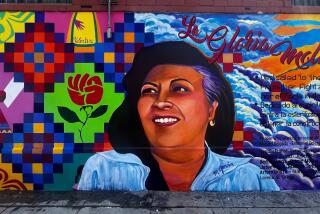A tuneful sisterhood
The daughters of Joni and Joan are alive and well and living these days in places like Buenos Aires and Portland, Ore. They also were on stage Tuesday night at the Troubadour, demonstrating to a transfixed crowd how they’ve absorbed the lessons of the aforementioned Mitchell, Baez and other elder stateswomen of the singer-songwriter sisterhood.
But Argentine Abstract Expressionist Juana Molina, who headlined Tuesday’s show, and Oregonian urban folkie Laura Gibson, who helped open it, also are finding inventive new ways to update and transmute two distinctly feminine singing styles and sensibilities.
Molina’s L.A. appearances have grown enormously in confidence and artistic daring since her first, reportedly faltering debut at McCabe’s in the late ‘90s. A Times critic’s description of that inauspicious event used words like “disastrous” and “visibly distraught” to describe the former com- ic actress’ U.S. coming-out party.
Whoever that flummoxed woman with the malnourished guitar was, she bore no resemblance to the poised, playful, utterly in-control performer who ripped into her Troubadour set with “Un Dia” (One Day), the aggressively hypnotic title track off her latest album. Hair loose and torso stripped down to a black camisole, the better to reveal her well-toned arms, Molina set to strumming her guitar and electronically looping her uncanny melange of digitally processed chants, scats, bird calls, banshee wails and other mystic incantations.
Although she was backed for most of the night, very ably, by Gregor Hilbe on drums and Martin Iannaccone on bass, Molina reserves the right to be upstaged only by herself. “Live alone, sleep alone, work alone, do everything alone,” she sang in Spanish on her second number, “Vive Solo,” a sentiment supported by her on-stage auto-efficiency as singer, guitarist and sound-mixing sorceress.
Her affectless voice is a lithe muscle that never strains for drama. There’s an undeniable freedom, and power, in Molina’s ability to conjure a lushly sensual, quietly erotic audio atmosphere without help from any musical significant oth- ers.
When she puts her technological tool bag to full use, you’d swear there are more women on stage than you could spot in a re-run of “United States of Tara.” At such moments, Molina’s autonomy, more traditionally the prerogative of male musicians, is absolute.
Even her more delicate chamber tunes, such as “Elena” and “La Verdad,” accrue subtle force through their trance-like rhythms and (on “Elena”) shimmering chord changes, which Molina and her bandmates delivered with a concentration verging on obsession. Some tunes start out sounding like nursery rhymes or lullabies, then suddenly take flight like Andean condors.
Self-empowerment also resides in Molina’s refusal to be bound by traditional pop or folk song structures. To put it bluntly, and despite certain parallels with Bjork, Beth Orton or the late great Chilean folk singer Violeta Parra, Molina makes instantly identifiable music that sounds like no one else’s.
Gibson flew into Los Angeles on the wings of a euphoric NPR review and quickly showed why the praise is deserved. A video of her strolling through a cemetery and such characteristically melancholy tunes as “Where Have All Your Good Words Gone?” and “Funeral Song” (from her new album, “Beasts of Seasons”) suggest that this artist is most comfortable, for now, on the rainy side of the street.
But in live performances, Gibson’s evident natural shyness is enlivened with an assertive emotional articulateness, in her writing, unadorned singing and guitar playing. She’s sweetly pensive rather than reflexively somber.
Still more gentle butterfly than majestic avian, she’s one to watch.
--
More to Read
The biggest entertainment stories
Get our big stories about Hollywood, film, television, music, arts, culture and more right in your inbox as soon as they publish.
You may occasionally receive promotional content from the Los Angeles Times.











